- Home
- Bette Lee Crosby
Wishing for Wonderful: The Serendipity Series, Book 3 Page 3
Wishing for Wonderful: The Serendipity Series, Book 3 Read online
Page 3
For decades scientists have tried to come up with the explanation for such an attraction. The brightest minds of all time have tackled the challenge and not one has come up with the right answer. Instead they create profiles and rationales, then set up a website promising these gullible love-starved humans the perfect mate. Hah. Granted, the humans are getting better at this game, but perfect matches come from one place and one place only—me.
John Gray
It’s been ages since Lindsay’s been home. I’m glad she’ll be here for Labor Day. It’s time I introduced her to Eleanor. With her mother gone all these years, I know she misses having a woman in her life. Women talk about things a man is no good at, and Eleanor, well, she’s a person you can’t help but love. I’ve had a fondness for Eleanor since the day we first met, and that seems like a lifetime ago. We were just kids, but even then I knew she was somebody special. Finding her again as I did has been good for me. I think she’s gonna be good for Lindsay too.
After Bethany died in the crash, I hated myself for being alive. I kept asking God why He couldn’t have taken me instead of her. Living in this house was like living in hell. Everywhere I looked there were reminders of Bethany: her sewing basket, slippers by the side of the bed, a robe hanging on the back of the door. She was in every room, and I couldn’t bring myself to get rid of even one thing. I can’t count the number of times I answered no when the Mustard Seed lady called and asked if I had any used clothing to donate. I was sleeping on a bed of nails and didn’t have the courage to move elsewhere.
Lindsay was living at Rutgers then. I think she stayed there partly because it wasn’t a place filled with reminders of her mother. I can’t say I blame her, but there were plenty of times I thought of calling and asking her to move home. The only thing that stopped me was Bethany’s voice whispering in my ear about how unfair such a thing would be.
Sometimes the loneliness got so bad I’d climb out of bed in the middle of the night and walk from room to room checking to see if anything had changed. Now I can see I was wallowing in my own misery, but back then I couldn’t see it. I couldn’t even bring myself to sleep in the middle of the bed. At night when I’d get into bed, I’d stay on my own side and leave Bethany’s pillow lying there like a turned-over tombstone.
About a year after the accident the doorbell rang, and when I answered it I was face to face with George Grumman. Even though it was icy cold and sleeting, he stood there with his hat in his hand and his eyes focused on his shoes. My first impulse was to grab him by the throat and choke the life out of him, but then he began talking and I could see he was living with the same kind of misery I was. I opened the door and asked him in.
“I’m so, so sorry,” he said. When George spoke I could hear the quiver in his voice. He went on to tell me how his little girl had been taken to the hospital the morning of the accident.
“I had to work,” he said, “but Maggie promised she’d call and let me know how our baby was doing.” He stopped, blew his nose then kept talking. “The phone was right there on the seat, but when I turned the corner it slid across to the other side. I looked to find it, and in those few seconds…”
He began sobbing. His shoulders shook, and his head fell forward as the tears came. His grief was so overwhelming that I had a hard time understanding the words he spoke. As he talked he kept his eyes fixed on the floor, like a man ashamed to look life in the eye.
“I ain’t had a moment’s peace since the day of the accident,” he said, and I knew it was true. Seeing George Grumman in such a state, I found it harder to hate the man. As he got up to leave I asked how his daughter was doing.
“She died two days after the accident,” he said. Then he walked out the door, and I never saw him again.
I thought about that visit for well over a week, and I was still thinking about it the night we had a thunderstorm that knocked out the power. I sat there in the dark for what might have been two hours; then I finally gave up and went to bed. I’m not prone to dreaming but that night I did, and the dream was so vivid I can remember it to this day. Bethany was dressed in a summertime dress, and she was as young and pretty as the day I married her. I couldn’t see myself, but I knew I was the one walking beside her. She turned to me and said, Don’t forget, then she laughed that same great laugh I fell in love with.
I tried to tell her that if I live to be a thousand I couldn’t forget her, but she covered my mouth with her fingers. Silly, I’m not talking about me! Don’t forget how to forgive, or you’ll forget how to love. She opened up the suitcase she’d been carrying and motioned for me to look inside. As I gazed down at the case I could feel her alongside my shoulder. She leaned close and whispered in my ear, Do you see me inside there?
I shook my head. It wasn’t Bethany, but it was all the things she’d left behind. She laughed again then picked up the suitcase and flung it into the sky. I could see myself trying to catch her sewing basket and the blue robe, but it was like trying to catch the wind. When I turned back she was gone, but I could still hear the sound of her laughter.
The next morning I found her bathrobe lying on the floor. After hanging in the same spot for over a year, it had fallen from the hook. I took that as a sign and finally called the woman from Mustard Seed.
Last year I ran into Eleanor and couldn’t help remembering what good times we’d had all those years ago. One thing led to another and now, for the first time in almost ten years, I am truly happy. At one time I thought I’d never find anyone as special as Bethany, but Eleanor has her own kind of special. It’s the kind of special that makes me very happy, and I think it’s gonna make Lindsay happy too.
Cupid
Trouble Starts
Women like Lindsay make me appreciate the Eleanors of this world even more. First of all, Eleanor called me by name and had one simple request: she wanted to be loved by John Gray. She never asked for more and never changed her mind. I knew that was a wonderful match from the time she first wished for it. I can assure you, that earlier marriage to Ray was an organizational fault, not Eleanor’s. I have my suspicions Life Management had a hand in it, but again that’s something I can’t prove. And without proof…well, you know how that goes.
Lindsay on the other hand doesn’t recognize true love even when it comes face to face with her. She ignored the perfect match I sent and went traipsing after a lunkhead with more muscles than brains; then she wondered why they had nothing in common. It’s humans like Lindsay who make this job impossible. Instead of trusting that I’ll give her the perfect mate, she’s created her own image of what this ideal man should look like. Now she expects me to produce someone who matches that description. I can tell you flat out that searching for love like you’d search for a suit, by size, color and cut, is the wrong way to go about it. In time the outside of a person changes; their hair turns grey, the muscles become flab and those sexy eyes often end up glued to a television. That’s why when I match lovers I go by what’s inside their heart. The heart of a person stays the same; it’s just the outside that changes.
Now that she’s got a set-in-stone image of her perfect mate, Lindsay’s begun to study the face of every male she passes. She eyes them on her walk to work and scrutinizes them when they stroll through the bookstore. Why, yesterday evening she even checked out two gay men who were folding their laundry in the basement of her apartment building.
~ ~ ~
After a full week of looking into faces that were all wrong, Lindsay returned home on Friday evening weary and disappointed.
Walker greeted her with an apprehensive smile. “Got a registered letter for you.” He shuffled through the pile of envelopes and handed one to her. It was from the Chelsea Building Management Company.
“Oh no,” Lindsay said. “Don’t tell me they’re raising the rent again.”
Walker shook his head. “Worse.”
“Worse?” Using her fingernail, she pried open the flap and began to read. “They’re kidding, right?”
/> Walker shook his head again. “Afraid not. Everybody in the building got the same letter. Ain’t nobody happy.”
“But is this even legal? How can they just decide to go condo without any input from the residents? Without a vote of some sort?”
“They own the building, so I guess they can do as they see fit.”
“It isn’t fair,” Lindsay said with a moan. “I don’t have this kind of money.”
“Few do,” Walker echoed soulfully. “Very few.” He was thinking of his daughter, Emily.
Upstairs in her apartment, Lindsay reread the letter three times. Each time the words remained the same. No renewal of the lease, blah, blah, blah, condominium conversion to be effective December 1, 2011, blah, blah, blah, the purchase cost for your apartment (3A) is $265,000, blah, blah, blah. The deadline date for declaration of intent to purchase is November 1, 2011.
“I can’t believe this,” she said and flopped down on the sofa.
A covering of gloom settled on Lindsay’s shoulders as she sat there counting up her losses. First Phillip; now the apartment. She imagined herself at the bottom of a well with no way to climb out. Buying the apartment was out of the question. She had barely enough money to plunk down a security deposit and pay for a mover.
With a swell of sorrow rising in her throat, she telephoned Amanda and tearfully reread the letter.
“I know, it stinks,” Amanda sympathized. “Chris got one too.”
“Chris?”
“Christopher Roberts. He lives in your building.”
“That’s the Chris you’ve been dating?”
“Remember I met him the night you broke up with Phillip? I asked if you’d mind…”
“Yeah, yeah, I remember. I just didn’t realize he was the Chris you’ve been dating.”
“It’s three months today. We’re going to Antonio’s to celebrate.”
“Antonio’s,” Lindsay repeated. “Nice place.” There was a note of melancholy in her voice, but apparently Amanda didn’t hear it because she chattered on and on about how wonderful Chris was.
When Lindsay hung up the telephone, she sat there for almost ten minutes trying to recall exactly what Christopher looked like. They’d had four dates, nice dates. She remembered the way he’d held her arm as they crossed the street, how he’d brought flowers on their second date, how at the restaurant he’d waited until she was seated before he sat. Slowly it dawned on her that Christopher was most likely a man with principles. How sad, she thought, that she hadn’t understood the importance of principles back then.
A picture of Christopher finally came to mind, and she compared it to the image she’d been carrying around. Luckily there were certain differences. He was a tad on the short side, and although his hair was light brown it was definitely too long. And there was that thing about wearing loafers with no socks; her father would never do that. With a sigh of relief Lindsay let go of the tension that had been building. For a moment she thought she’d met her ideal man and somehow failed to recognize him.
Anyway, she reasoned, Christopher wasn’t Christopher anymore. He was now Chris. Amanda’s Chris.
~ ~ ~
I warned you this was going to happen, and it’s only the start of things to come. I’ve already explained I can’t override Life Management events. That department has the last word on almost everything. They decide who wins and who loses, who stays and who goes. Unfortunately, a number of their decisions have fouled up my best matches. One flick of a finger from Life Management, and a person’s life changes forever. It saddens me, but I can’t stop it from happening. All I can do is help people pick up the broken pieces and fall in love again.
~ ~ ~
On Tuesday morning Lindsay went right back to what had become her routine: pick up a latte at Starbucks and walk to the Big Book Barn. Only now she didn’t even glance at the faces of the males she passed; she was too focused on the thought of finding an affordable apartment. She was in the midst of tallying the price of new window shades when she pushed through the glass door and saw Sara McClusky dabbing her eyes with an already soaked tissue.
Lindsay bypassed the counter and walked over to Sara. “What’s wrong?”
Instead of answering the question, Sara pulled another tissue from her pocket and blew her nose. Then she started sobbing again. When Lindsay repeated the question for the third time, Sara waggled a finger toward Howard, the store manager.
“Ask him,” she said, sniffling.
“I will,” Lindsay answered and turned toward the counter where Howard stood. He had the look of a man who’d downed a glass of sour milk, but that didn’t stop Lindsay. “What’s wrong with Sara?”
Howard crooked the right side of his mouth. It was the same expression he used when customers came to him complaining that a book cost less at some other store.
“It’s not just Sara, it’s everybody,” he grunted. “Pennington is closing the store.”
“Closing the store? Why?”
Howard shrugged. “Supposedly the rent’s too high, so he didn’t renew the lease.”
“What about us? What about our jobs?”
Alfred Pennington owned five bookstores in the city: three in Manhattan, one in Brooklyn and another in the Bronx. The Big Book Barn was the smallest and least profitable.
“There are no jobs,” Howard said. “He’s closing the doors November thirtieth and giving everyone two weeks’ severance. That’s it.”
“You mean we’re all out of a job? Even you?”
Howard lowered his head and started to fumble with some invoices on the counter. “Well, not me. Pennington found a spot for me at the Madison Avenue store.”
“You’re kidding! Sara and I have been with the store for almost two years; you’ve been here six months. What about seniority?”
Howard cleared his throat. “Pennington and I discussed that, but the problem is he needs a store manager and neither of you are qualified to—”
“Qualified? I know more about this store than you do!”
Not ready to argue that claim, Howard turned back to the invoices he’d been checking. “The decision’s been made. November thirtieth is your last day.”
Lindsay felt an angry ball of fire starting in her toes, running up her legs, spreading to her arms and eventually bubbling up into her mouth where it shot out in a barrage of angry words.
“So, you’re manager material, huh? Well, then, try managing the store without us!”
She grabbed the red-eyed Sara by the hand and started toward the door. With one foot already outside, she turned back and shouted, “We quit!”
Although Sara looked a bit doubtful, she tagged along saying nothing. Lindsay angrily stomped across Second Avenue with Sara trailing a full pace behind and kept going until they crossed Twenty-First Street. She then slowed her pace.
“What now?” Sara asked timidly.
“Don’t worry,” Lindsay replied, “once Howard has a few hours of doing everything himself, he’ll be begging us to come back. He’ll insist Pennington find a spot for us in one of the other stores. Just wait.”
The two girls walked north to Twenty-Fifth Street then turned and started toward Broadway. As they went, Sara continued to express her doubt that Howard would change his mind.
“Even if he does,” she said, “what makes you think he can convince Pennington to find a spot for us in another store?”
“Just trust me,” Lindsay answered and kept right on walking.
It was barely ten-thirty when Lindsay suggested they stop for lunch. “We might as well take advantage of the few hours we have off,” she said with a laugh.
Confident Howard would be calling before long, Lindsay checked to make sure her cell phone was turned on. Seeing the look of doubt on Sara’s face, she again assured her.
“You’ll see,” she said, “he’ll be begging us to come back. Why, I bet we won’t even have time for dessert.”
They settled into a booth, ordered sandwiches and began to wait. A
fter an hour had passed, Lindsay pulled the cell phone from her purse and laid it on the table.
“When we’re chatting I might not hear the phone if it’s in my purse,” she explained.
They ordered another round of Cokes and the cell phone sat there, silent as a graveyard. There was no ring, not that hour or the hour that followed. In time small groups of people wandered in, ate lunch and left. Still the phone did not ring.
“Maybe we should go ahead and splurge on a decadent dessert,” Lindsay suggested feebly.
“Maybe we just ought to go back and say we’re sorry,” Sara replied. “If Howard needs help, he might be willing to let us keep our jobs.”
“And then what?” Lindsay said. “In two months, we’re out of a job again. Is it worth it to go groveling for a measly month or two?”
Sara hesitated for a moment, then stammered, “Yeah, I think maybe it is.”
“He’ll call. Just give him time.”
Two full days passed with no call from Howard. Sara eventually went back to the store and found two young men behind the counter.
“You work here?” she asked. The taller one nodded.
“Since when?”
“Yesterday,” he answered in the bubbly voice of an energetic new employee. “Right now the job’s temporary, but I’m hoping it’ll become permanent.”
“It won’t,” Sara said sadly; then she turned and walked out. Moments later she telephoned Lindsay.

 Emily, Gone
Emily, Gone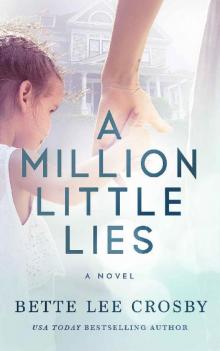 A Million Little Lies
A Million Little Lies Previously Loved Treasures
Previously Loved Treasures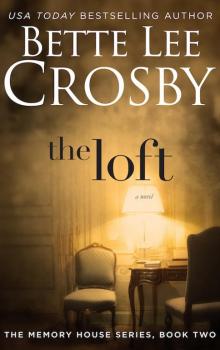 The Loft
The Loft Spare Change
Spare Change Memory House: Memory House Collection (Memory House Series Book 1)
Memory House: Memory House Collection (Memory House Series Book 1)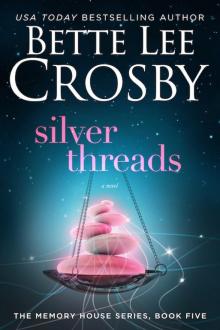 Silver Threads
Silver Threads Wishing for Wonderful: The Serendipity Series, Book 3
Wishing for Wonderful: The Serendipity Series, Book 3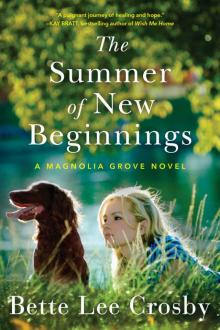 The Summer of New Beginnings: A Magnolia Grove Novel
The Summer of New Beginnings: A Magnolia Grove Novel The Regrets of Cyrus Dodd
The Regrets of Cyrus Dodd Passing Through Perfect
Passing Through Perfect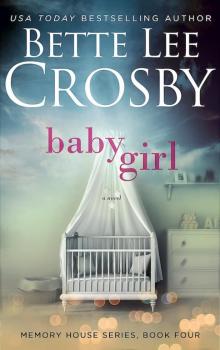 Baby Girl
Baby Girl Jubilee's Journey
Jubilee's Journey Beyond the Carousel
Beyond the Carousel What the Heart Remembers
What the Heart Remembers Cupid's Christmas
Cupid's Christmas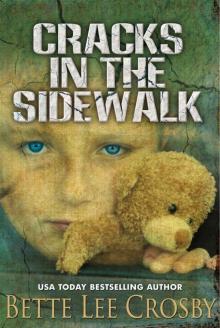 Cracks in the Sidewalk
Cracks in the Sidewalk Blueberry Hill
Blueberry Hill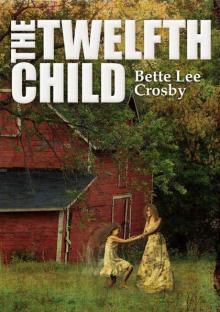 The Twelfth Child
The Twelfth Child A Year of Extraordinary Moments (A Magnolia Grove Novel)
A Year of Extraordinary Moments (A Magnolia Grove Novel)